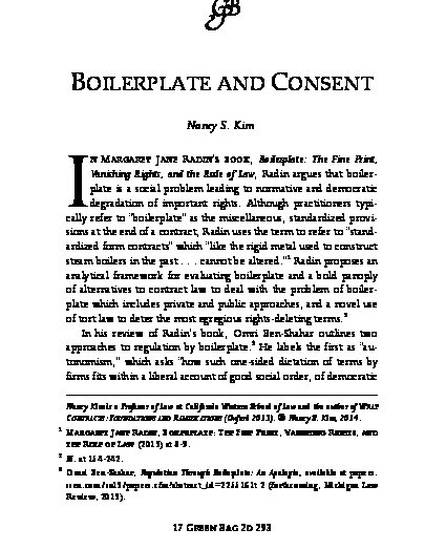
In Margaret Jane Radin's book, Boilerplate: The Fine Print, Vanishing Rights, and the Rule of Law, Radin argues that boilerplate is a social problem leading to normative and democratic degradation of important rights. In his review of Radin’s book, Omri Ben-Shahar outlines two approaches to regulation by boilerplate. He labels the first as “autonomism,” which asks “how such one-sided dictation of terms by firms fits within a liberal account of good social order, of democratic control and participation, and of individual autonomy.” Ben-Shahar views Radin as representative of the autonomists. The second way of viewing regulation-by-boilerplate is “to ask how it affects the well being and satisfaction of consumers who buy products co-packed with boilerplate.”
According to Ben-Shahar, boilerplate apologists believe that boilerplate is welfare-enhancing because it reduces transaction costs and, presumably, prices. Therefore, he argues, boilerplate is what consumers want anyway – a generalization that Radin disputes. More importantly, it ignores the larger questions raised by Radin’s book regarding the limits of consent: Even assuming that consumers want boilerplate, how much does that matter? Or, to put it differently, Are there limits to consent? Are there some things to which we, as a civilized society, should not permit consumers to consent?
This Essay does not attempt to answer those questions. Rather, it posits that they are unanswerable without a better, more nuanced definition of consent – one that takes into account contracting realities such as contracting environment, contract presentment, the nature of rights affected, and the burdens created by boilerplate.
